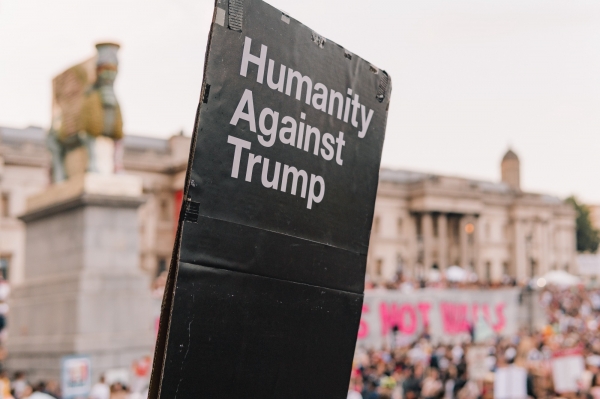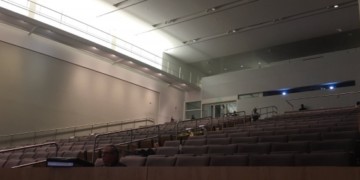It should have been obvious with the National Climate Assessment; it wasn’t.
B Nguyen FeiBlockedUnblockFollowFollowingDec 1
On November 26, 2018, Trump was faced with the annual National Climate Assessment.
The National Climate Assessment is an in-depth governmental report on the causes and effects of climate change.
Yet, the detailed prospect of ecological collapse, economic downturn, and inevitable extinction didn’t appear to walk Trump back from his controversial statements on climate change.
Even as the American economy is losing billions of dollars from environmental degradation, unprecedented natural disasters displace hundreds of thousands of Americans annually, and the international stage rebukes Trump’s credibility as a world leader post-Paris withdrawal, the words “America First” seem contradictory to Trump’s pro-fossil fuel agenda.
Yet, Trump isn’t the first wedding of “capitalism” and “contradiction.”
Rather, Trump is an aftereffect of a system that is paradoxical by nature.
Karl Marx theorized that capitalism is structured by a variety of internal contradictions, such as overproduction and corporate anarchy.
As climate change slowly destroys the earth species-by-species, ecosystem-by-ecosystem, humanity will soon learn (the hard way) of another contradiction: infinite growth will never be compatible with a finite planet.
Trump, obviously, is not the first capitalist nor president to command the levers of power in favor of corporations. Yet, his election coincides with the climate tipping point; if he plays his hand right, we might never have another chance to mitigate and reverse the effects of climate change.
Trump’s historic campaign for presidency included a pro-fossil fuel agenda.
He promised to reverse the Obama administration’s regulatory mechanisms for controlling the fossil fuel industry’s polluting practices.
In place, he would usher in a pro-fossil fuels agenda that turns the other cheek towards the ongoing destruction of the earth.
His campaign pandered to both sides of the class struggle. Corporations were pleased to be deregulated. American workers — although suffering under the everyday realities of rising sea levels, unstable weather, and substandard air quality — were persuaded by Trump’s notion of a “regulated” American dream.
Although Trump has decades of environmental protections and corporate regulations to walk back before he can configure a pro-fossil fuel government, he still has two years left in his current term and a potential reelection in 2020 if democrats don’t play their cards right. Unlike his other campaign promises, Trump seems to be all but faltering in rolling back years of progress:
- To lead the EPA, Trump appointed Scott Pruitt: a notorious climate denier known for suing the EPA not once, but fourteen times.
- With an executive order, Trump confirmed the construction of the Keystone XL and Dakota Access Pipelines.
- Half a year into his presidency, Trump withdrew from the Paris Agreement and significantly dwindled the legitimacy of the international accords.
In only a few exercises of executive power, Trump has lost billions of dollars for the American economy, endangered millions of Americans, and wrecked American leadership on the international stage; yet, he presses forward with his pro-fossil fuel agenda nevertheless.
Trump’s cognitive dissonance regarding an “America First” economic approach and a pro-fossil fuels environmental approach can be analogized to the overarching relationship between capitalism and climate change. Even as climate change threatens the existence of capital in a variety of different ways, capitalism continues to produce and exploit in wake of the hard evidence.
Trump is proof that capitalism is broken by design, but what does it mean for capitalism to be “broken by design”?
According to Marx and his successors, capitalism has inherent flaws and contradictions that constantly destabilize the health of the system.
Although capitalism is seen as a “natural” socioeconomic formation in contradistinction to “evil” communism or “useless” socialism, economic thinkers have long observed the irrationality of capital. As the contradictions of capitalism eventually lead the system to failure, it would appear that economists were all but wrong.
Example one: technology is breaking meritocracy.
The desire to appropriate more and more labor is fundamentally incompatible with the drive to revolutionize the means of production. With technological advancements hinting towards a bigger presence of artificial intelligence within our workforce, the replacement of workers seems more of a reality than ever. As our technology continues to develop, the working class shrinks; people are put out of work.
In a meritocracy where the emphasis lies within working harder, better, faster, and stronger under capitalism, the concept of being more productive becomes self-defeating. Today, workers are innovating the technologies, producing the parts, and developing the procedures towards their own substitution; the fruits of their labor allude to their inevitable replacement by technology nonetheless. Therefore, no matter how productive (or unproductive) the worker is, their exploitation is inevitable.
Example two: overproduction is breaking market equilibrium.
Capitalism is permanently locked into war with itself. The price of a commodity must be enticing for a consumer; if every price in the market is equally as enticing for consumers, then prices are be dropped in response. But if every capitalist drops their prices to match those of their competitors, then market regresses back to the original problem, leading to a downward spiral of competition where profits continue to shrink while sales stagnate.
Under capitalism where the goal is to accumulate as much capital as possible, the decrease in prices naturally leads to the increase in production to make up for profits. Although supply increases at an astonishing rate, demand remains stagnant; the market is supersaturated with products that no buyer will purchase. If supply and demand guide the standards of the who/what/when/where/why of production (they do), then the capitalist must scale down to match the wants of the market.
Empirically, “scale down” looks like the shutting down of factories and the laying off of workers; capitalism must terminate its own means of production in order to survive, which is inherently contradictory with the desire to revolutionize and exploit the means of production. Again, the workers who are laid off and denied wages are caught in the crossfires of capitalism’s inherent contradictions.
Our most pressing contradiction of capitalism as of now is climate change.
Environmental degradation isn’t an externality; it’s a design feature.
Throughout human history, the means of production have represented the relationship between humans and nature. In order for human beings to survive, we must consume nutrients, build shelters, organize groups, and ward off threats. By harvesting, growing, working, and expending natural resources, we’ve been able to fulfill basic human needs for survival.
During the Paleolithic era, humans hunted and foraged for resources that were being produced on nature’s own terms; humans did not control the abundance (or lack thereof) of these resources. If nature could not provide what they needed, they were forced to migrate across lands; they did not have the knowledge or the technology to create malleable environments directed towards their subsistence.
The Neolithic Revolution ushered in agricultural processes that allowed humans to create and control microcosms of nature. Although crop yields were still reliant on a variety of uncontrollable natural processes — such as soil fertility and availability of water — humans could generate resources under somewhat predictable conditions and assume some control over natural resources.
By the Industrial Revolution, these harmonious microcosms grew into parasitic macrocosms that bent nature to humanity’s will. By emphasizing quantity over quality in terms of agricultural practice, we’ve squeezed as much out of earth’s natural resources as humanly possible. Our efficiency may have led to rapid developments across the board for the past few centuries, but at the cost of destroying ecosystems, draining reserves, and disposing waste.
Capitalism is environmentally contradictory because infinite growth cannot happen on a finite planet.
The desire to infinitesimally expand capital is a faulty logic embedded within the structure of capitalism.
Eventually, there will be no more fish to fish; no more ore to mine; no more land to till; no more animals to raise. In other words, capitalism neglects future capital; the dollars of today seem to be more important than the dollars of tomorrow.
The release of the National Climate Assessment and Trump’s unsurprising response to the evidence of climate change should lend itself as a textbook example of how blatant the inherent flaws of capitalism can be.
Broadly speaking: the capitalist, even when faced with the threats of economic downturn and planetary destruction (both of which appear to be clear threats to the existence of capital entirely), is willing to accept (through denying) their self-made destruction.
We need to change the way that we think about climate change.
A mindset shift about climate change in the context of capital is necessary towards progressive solutions that actually work.
Under rational economic thought, climate change is merely an “externality” produced from market forces. The thoughts of economists bleed into the mainstream, generating a public consciousness that climate change is simply an “adverse side-effect” of production.
This rhetoric of “externality” or “adverse side-effect” only footnotes and neglects the problem at hand, while only ascribing the blame to “bad capitalists” rather than “capitalists” writ large. In other words, climate change is seen as a mistake of capitalism rather than a core responsibility.
Even to mainstream advocates of environmental justice, the problem of climate change seems extricable from the structure of capitalism by blaming the individual over the corporation. The idea that we can remedy climate change by becoming vegan, shopping organic, recycling, or turning off the lights feeds ignores how corporations are primarily responsible for emissions, waste, and environmental degradation.
We all know that climate change exists.
Knowing why — through a class analysis — can generate the solutions we need in order to mitigate and reverse climate change.
By looking backwards into the past and walking back the history of how humans have empirically devastated the environment, we can produce a revolutionary forward-thinking vision of how to create equitable socioeconomic organizations that endorse a constructive — as opposed to destructive — relationship to nature.
Concurrent with the development of Marxism were adaptations of Marx’s theories with strategies to safeguard the environment. Although Marx might not have had all of the answers for developing a socioeconomic system to replace capitalism — much less systems to preserve the environment — we must orient ourselves towards finding them in the now.
Example one: energy.
Clean and accessible energy sources are a direct challenge to fossil fuel money. They will never be as cheap as oil, natural gas, or coal, which means that the green energy sector necessarily requires removing profit as a driving motivation for participating in the market.
Unfortunately, their lack of competitive merit within the market is what dooms them to failure. Under capitalism, cheap and accessible are synonymous; therefore, consumers and producers alike will settle for what keeps the lights on without breaking the bank.
Only by deconstructing the hegemony of the fossil fuel industry can we allow greener solutions to break into the mainstream. As of now, we have the technologies and the infrastructures to power the earth sustainably. However, our world still has preference for oil rigs and coal mines.
Example two: agriculture.
Sustainable farming practices rely on quality over quantity, which is antagonistic to corporate farming procedures that produce as much as possible at any and all means necessary. Therefore, profit must be removed from the equation in order for agriculture to be environmentally safe.
Yet, what makes the quantity over quality model so appealing is that prices are dirt cheap; in a world where the majority of people are impoverished, many have no choice but to settle for the chain grocery store over the sustainably-sourced food co-op.
Only by developing a healthy relationship between efficient and sustainable agricultural practice can we serve billions without destroying the earth in the process. According to various studies, we could feed everyone on the planet if we distributed resources equally; therefore, efficiency doesn’t have to take precedent over everything else.
In conclusion, we cannot compromise with capitalism to solve climate change.
The market has no space for clean energy or sustainable agriculture.
With industries monopolizing the destruction of the earth and creating barriers to entry for those who seek to challenge the thesis of environmental degradation that underwrites these industries, working “with,” “in,” or “under” capitalism will never suffice.
The government has no space for environmental protection.
Trump is a reminder that capitalism has always had a stranglehold on democracies across the board through campaign finance and political corruption. As we near the tipping point with an EPA devastated by Pruitt and an administration run by Trump, we’re running out of time to negotiate with the government over the fate of the earth.
We need to think outside of the box.
So long as we exist under capitalism, there will never be a more profitable commodity than the fossil fuel, nor will there be anyone more powerful than the fossil fuel executive. The influence of the fossil fuel will always control the terms of agreement and strike out “climate change” at every step of the negotiation.
We cannot play on the turf of capitalism; they will always win the hearts (and pockets) of consumers and producers over. Therefore, we need to rethink environmental justice to consider that, maybe, climate change was never an accident or a miscalculation.
Only an analysis that exposes the inherent flaws of capitalism can bring us closer to the truth about why we are hanging on a thread for planetary survival. Hopefully, we will have found out the truth about capitalism before the prospects of a greener future are too late.


























Connect with us